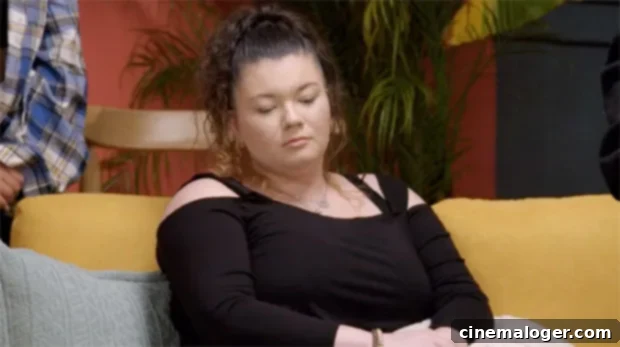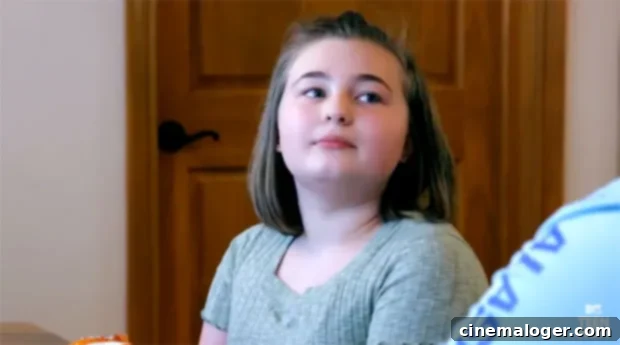Amber Portwood’s Emotional Journey: Rebuilding the Mother-Daughter Bond with Leah on Teen Mom: Family Reunion
The highly anticipated Jan. 25 episode of Teen Mom: Family Reunion offered viewers an intimate look into the often-complex world of reality television stars, particularly focusing on the deeply personal struggles of Amber Portwood. Known for her tumultuous past on Teen Mom OG, Amber bravely opened up about her ongoing challenges in mending her relationship with her 12-year-old daughter, Leah Shirley. While there have been hopeful signs of improvement between the mother and daughter, Amber candidly admitted that the scars of the past are far from healed, revealing the emotional toll it has taken on both of them, especially Leah’s feelings of embarrassment.
The Unfiltered Reality: Addressing Past Wounds with Leah
Amber Portwood’s journey with her daughter Leah has been a central narrative of her life in the public eye. For years, viewers have witnessed the highs and devastating lows of their connection. During this particular episode of Teen Mom: Family Reunion, Amber didn’t shy away from the raw truths, discussing the delicate balance of acknowledging her past mistakes while striving for a healthier future with Leah. The conversation served as a poignant reminder that while time moves forward, the echoes of past actions, particularly those documented on national television, linger and shape present-day dynamics within families.
The conversation around therapy, a tool often stigmatized, arose during the episode when fellow Teen Mom cast member, Briana DeJesus, shared her own contemplation about seeking professional help for her daughter, Nova, regarding her relationship with her father. Briana expressed initial hesitation, questioning whether Nova was at a stage where therapy was truly necessary to navigate the complexities of her parents’ strained relationship. This query sparked a broader discussion among the group about the merits and benefits of family therapy, especially for children growing up amidst parental conflicts and public scrutiny. It highlighted the universal struggle many parents face in deciding when and how to introduce mental health support to their children.
The consensus among the cast members, and a valuable lesson for viewers, was that therapy, regardless of the perceived severity of a situation, is a proactive step towards emotional well-being and improved communication. It’s a tool that provides a safe, neutral space for individuals to express themselves, understand underlying issues, and develop coping mechanisms. The emphasis was on prevention and early intervention, rather than waiting for a crisis to unfold. This collective encouragement for therapy set the stage for Amber to share her own, very personal experience, demonstrating how it has become a cornerstone of her efforts to rebuild with Leah.
Therapy: A Bridge Towards Healing for Amber and Leah

Amber Portwood confirmed to the group that she and Leah are, in fact, actively engaged in therapy together. Her endorsement of the process was unequivocal, describing it as “the best thing to f***ing do” for their struggling relationship. This revelation underscored the severity of the rift that had formed between them. “She doesn’t want anything to do with me,” Amber admitted, a heartbreaking confession that painted a clear picture of the emotional distance that had grown over the years. This candid statement highlighted the profound disconnect Amber felt with her daughter, making the pursuit of therapy not just an option, but an essential lifeline for their future relationship.
Therapy, as Amber explained, provides a structured environment where difficult conversations can occur with the guidance of a professional. For a mother and daughter whose bond has been fractured by public struggles, legal issues, and personal demons, this neutral ground is invaluable. It allows Leah a safe space to voice her feelings, frustrations, and fears without feeling the pressure to protect her mother, or to suppress her emotions. Simultaneously, it provides Amber with the tools to listen actively, validate Leah’s experiences, and respond constructively, rather than defensively or reactively. This commitment to therapy signifies a profound shift in Amber’s approach to parenting and personal accountability, moving beyond past patterns of conflict and misunderstanding.
Leah’s Feelings: The Weight of Public Perception and Parental Past
The conversation took an even more poignant turn when fellow cast member Cheyenne Floyd asked Amber to confirm something that had perhaps been discussed off-camera: whether Leah was “embarrassed” by her mother. Amber’s direct and honest reply was, “She is — she’s said it before.” This admission brought a wave of empathy from her co-stars and resonated deeply with viewers who understand the unique challenges faced by children of public figures, especially those whose parents have struggled with addiction, mental health, and legal issues in the spotlight. Leah’s vulnerability in expressing this emotion, and Amber’s willingness to acknowledge it publicly, speaks volumes about the raw honesty fostered in their therapy sessions.
Leah’s embarrassment is a complex emotion, likely stemming from a combination of factors. Growing up with a mother whose life and struggles were extensively documented on Teen Mom OG means that Leah has had her childhood milestones, from school events to personal celebrations, often overshadowed by her mother’s highly publicized arrests, mental health crises, and relationship woes. Children naturally want to feel proud of their parents, and when a parent’s actions become fodder for public discussion and criticism, it can be deeply unsettling and humiliating for a child, particularly during the sensitive pre-teen years when identity and social standing are paramount. Amber’s willingness to acknowledge and validate Leah’s feelings, rather than dismiss them, is a crucial step in bridging the emotional chasm between them and fostering a relationship built on trust and understanding.
Confronting the Past: Sobriety, Accountability, and Growth
Cheyenne then posed a critical question: How does Amber navigate discussing the difficult and often traumatic events that have aired on Teen Mom OG over the years with Leah? Amber’s response was a powerful demonstration of her newfound commitment to honesty and accountability. She unequivocally stated, “There’s no excuse.” This simple yet profound statement marked a significant departure from past behaviors where she might have rationalized or minimized her actions, instead embracing full ownership of her history and its impact.
Amber continued, explaining the crucial turning point in her life. “I wasn’t sober. I had to get sober. The only way I was going to get sober was if I told them, ‘Put me in prison.’ When I went, I finally got sober.” This raw confession shed light on the extreme measures she had to take to achieve sobriety, acknowledging the depth of her addiction and the desperate cry for help that led her to incarceration. Her time in prison, while undoubtedly challenging, ultimately served as a catalyst for her to confront her substance abuse issues head-on and begin a path towards recovery. She explained that after achieving sobriety, she began seeing Leah again, but then faced a new challenge – a “void” that led her to seek out unhealthy relationships, stating, “I started seeing all these men.” Again, she concluded with, “There’s no excuse,” emphasizing her understanding that these subsequent choices, while perhaps born from underlying emotional needs, were still her responsibility and contributed to the strain on her relationship with Leah.

This level of self-awareness and willingness to take full responsibility for her past actions, without deflection or blame, resonated deeply with her co-stars. Her ex, Gary Shirley, who is also Leah’s father and has often been Amber’s staunchest supporter and toughest critic, along with long-time co-star Maci Bookout, were quick to commend Amber for her remarkable “growth” over the past few years. They both expressed that they had observed a significant transformation in Amber, particularly noting the profound difference in the way she now discusses her tumultuous past with candor and introspection. This validation from individuals who have witnessed her struggles firsthand holds immense weight, signaling a genuine and perceivable change in her character and approach to life, offering hope for her future with Leah.
From Excuses to Empowerment: Redefining the Narrative
Amber further elaborated on her personal evolution, acknowledging that in the past, she frequently used her struggles with depression as an “excuse” for her actions and her inconsistent presence in Leah’s life. “I thought everything I was doing was fine,” she admitted, reflecting on a time when her mental health challenges dictated when she would or wouldn’t see Leah. This period was marked by a cycle where her depression often led to withdrawal, further exacerbating the distance between her and her daughter. However, Amber proudly stated that she has “changed” that destructive behavior, demonstrating a powerful shift in her mindset.
Her transformation is rooted in a conscious decision to separate her mental health diagnosis from her personal accountability. While depression is a legitimate and serious condition requiring professional care, Amber has learned that it doesn’t absolve her of the responsibility to manage her life and maintain her commitments, especially to her children. She now approaches her mental health with a proactive stance, seeking treatment and developing coping strategies, rather than allowing it to be a barrier. “I’m not making excuses to her anymore,” Amber declared to the group, a powerful affirmation of her commitment to being a present, consistent, and honest mother. This shift from making excuses to actively seeking solutions, like therapy and sustained sobriety, demonstrates a profound level of maturity and self-awareness. It’s a journey of continuous effort, acknowledging that while the past cannot be erased, the future can be shaped by consistent, loving actions and genuine accountability, paving the way for a stronger, more authentic mother-daughter relationship.
The episode of Teen Mom: Family Reunion concluded with a strong message of hope and the ongoing nature of personal growth. Amber Portwood’s candid revelations about her relationship with Leah served as a powerful reminder that healing is a process, not an event. Her willingness to be vulnerable, to embrace therapy, and to openly acknowledge her past mistakes offers not only a pathway for her own family’s healing but also an important message for viewers navigating similar challenges. It’s a testament to the idea that with sustained effort, honesty, and professional support, even the most strained relationships can begin to find a path toward reconciliation and understanding, underscoring the resilience of the human spirit.
For those interested in following Amber’s continued journey and the stories of other cast members, new episodes of Teen Mom: Family Reunion air Tuesdays at 8 PM on MTV. The series continues to provide an unvarnished look into the lives of these women, offering both entertainment and valuable insights into the complexities of modern parenting and personal growth, encouraging important conversations about mental health and family dynamics.
